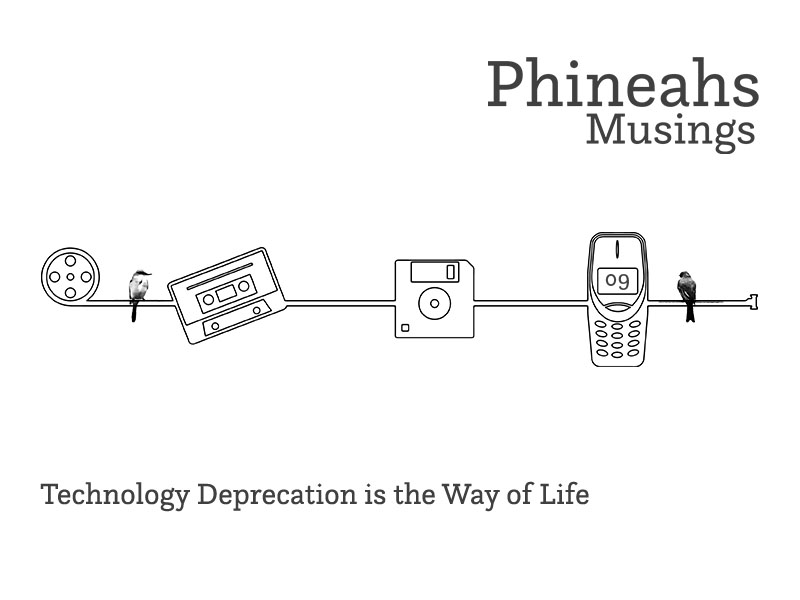Technology Deprecation is the Way of Life
3 min read

Think of technology as a tool; tools always change and there will always be a new shiny tool in the market store that does the current work better. For me technology, is a tool in my creative, economic, and social toolbox.
NAIROBI, Kenya, August 15, 2023/-- We all keep talking of how fast modern life is, and this notion is supported by the constant marketing around us. Modern life is complex but slow in the greater time scale of time.
Can you remember the last time you engaged with flash (macromedia flash) or uttered the words “java applets”? Or went to the post office to look up your emails on a Dell monitor secured counter top level? (Poor me in 2004)
Those days when floppy disks were the saviors, my mother's aunt who is obviously my grandaunt was a principal at two computer colleges, one at Emperor Plaza and another at Kimathi House. Through her exposure she wilfully worked to create an enabling environment for other family members and mainly the girl child to pursue the world of computing (Women in Tech Version 0.001, before AkiraChix was a thing).
In little time my dear mum was rocking the world of WordStar, Lotus 1-2-3, and dBASE. Another aunt later bootstrapped her own computer college, offering busy Nairobians evening and weekend classes on computer packages.
On my dad's side, I also have an uncle who pursued electrical engineering at the University of Nairobi having his intro to computing in Pascal programming language, and I remember him lamenting the torture of learning it.
All these computer packages, protocols and programming languages though all beneficial at the time are today dead. Dead in the sense of dead languages, and Latin would be a good example. Since, they offered a foundation for new applications, networks, and languages we currently use.
My generation most of which is digital native, has been lucky to have grown up and come of age when internet connectivity in Kenya was blooming (something we take for granted). Remember those days of dog slow dail-up connection or of relying only on Jambonet ISP; no nostalgia there! (Mad respect to cyber cafés for the lord’s work you did)
Kenyan political goodwill at the time (Kibakinomics), literally plugged us properly to the global information age with good policies and infrastructure. A team led by Bitange Ndemo oversaw the laying out of the fibre optic in 2007; and the rest, as they say, is history.
My journey in tech is long, convoluted and it will take a 3 hour read journal to map out. Let me spare you the agony and get to the matter at hand.
We are fascinated with technology to the extent of dogma. Technology is basically a way of doing things (no matter the context), and when we found a better way of doing something we leave the past. Fanatics are allowed to revel on nostalgia, but for a practical world we should always move forward.
I was once a bigger believer in curating and archiving most aspects of technology and the internet, but now I think I'm fine with the natural cause of obsolescence and deprecation.
Linked to this topic, is embedded or institutional obsolescence. Best represented by renowned architect Adolf Loos 1910 essay series titled Ornament and Crime, a response to the late 19th and early 20th centuries misuse of decorations in daily work.
Part of his observation was that; the Austrian national economy thrives on an industry where ornamentalists, believe: "A consumer who has his furniture for ten years and then can't stand it anymore and has to re-furnish from scratch every ten years, is more popular with us than someone who only buys an item when the old one is worn out. Industry thrives on this. Millions are employed due to rapid changes."
Despite the fact that, capitalism’s myopia can be blamed for such observation even today; we should be keen when something has become rudimentary obsolete and move on.
Think of technology as a tool; tools always change and there will always be a new shiny tool in the market store that does the current work better. For me technology, is a tool in my creative, economic, and social toolbox.
The next time you meet a person who has Fortran, Cobol or Pascal under his or her belt tip your hat and remind them it was a passage of life.
In conclusion, we ought to understand the fundamentals of technology and its use in solving problems. The syntax will change but with first principle thinking and a bit of pattern matching you can anticipate much of the problems the world will present.
To get a glimpse of the essence of technology, check this video of a Japanese factory that designs clothes on a 40 year old computer.
email feedback to phineahs [at] wazomoja.com

 Hey, Africa! Build Infrastructure!
Hey, Africa! Build Infrastructure! Star Performer, Showstopper, and Lazy Teammate
Star Performer, Showstopper, and Lazy Teammate O Al Fresco Dining, Where Art Thou?
O Al Fresco Dining, Where Art Thou?